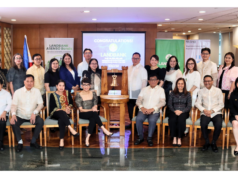This was the assessment made by Department of Foreign Affairs (DFA) Undersecretary for International Economic Relations Laura Q. Del Rosario who also said the K-12 program “is a tool” for the Philippines to be competitive within the Asia Pacific Economic Cooperation area.
The K-12 program aims to uplift the quality of education in the Philippines in order for graduates to be easily employed. It also aims to meet the standards required for professionals who would want to work abroad.
During the media forum “Inn The News” organized by the Capampangan in Media, Inc. in cooperation with the Holiday Inn Resort Clark, Social Security System and the Clark Development Corp. at the said hotel here last Friday, Del Rosario said the Philippines lags behind other nations in enhancing its educational program.
She said the average number of years for Americans who stay in the US educational system is 14 years, which is K-12 plus two years just like Canada, Japan, Singapore and Australia, she noted.
This is a reversal as compared to the Philippines because Filipinos stay in school at an average of only six or seven years, she lamented. These are the children of the marginalized sectors like farmers, fishermen and the like, she said.
China is like the Philippines but the difference is that China has its own scientists and research and development (R&D), Del Rosario pointed out.
“The point is, if this is our average years of education…seven, how can we compete?” she asked.
“When people talk about Philippine labor, they’re just talking of not even a million skilled workers or highly skilled workers because they’re just a few,” Del Rosario said.
Human capital
“So when we are talking of sustainability, I think we should look at human capital development,” she said.
“One of our APEC priorities really is inclusive growth which means we have to work on our human capital development,” she added.
“So why do we average only seven years? Assuming and to be fair we have more classrooms now and we have more teachers, but we cannot fully implement the K-12 program because there’s a TRO,” she lamented.
“I talked to the teachers’ groups and asked them why did you do that (TRO)? Many of them said they are losing their jobs. But don’t you see that jobs are being created from 11 to 12? They don’t see the connection.
What about the jobs created for grades 11 and 12?” Del Rosario said.
But to the teachers that’s a different issue, she said.
Del Rosario said it’s a matter of retooling. “The 1 and 2 should be retooled for them to teach 11 and 12. After all, this is supposed to be higher than grade 10. But they just refused to accept that,” she said.
“Iba daw ang pagturo ng high school hindi nila kaya (It’s different to teach high schools, the teachers can’t cope),” she added. “But that is why we are retooling,” she pointed out. Retooling is a teaching technique, she said.
Del Rosario warned that if the Philippines will slow down on this, we will be left behind by Vietnam who is pushing its own K-12 program.
She said there are now only three countries that are not K-12 – “our country Chad and Mali in Africa.”
Del Rosario stressed that the Philippines need the K-12 program to be competitive. She said the Philippines is one of a few underdeveloped countries with short years for full education.




